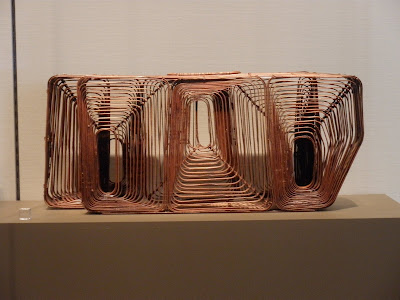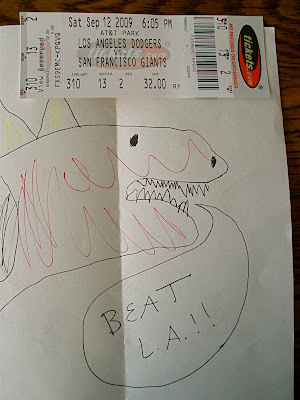
So what happened down the road, after the great Cockroach Battle of Villahermosa?
(If confused, see yesterday, and if you want to know how they got there, see the day before that.)
Pues. First of all, the city of Villahermosa, which means beautiful mansion, is truly a city of mosquitoes in the summer. Second, the amazing relics of Villahermosa, which are ancient Olmec heads, with flat, swollen faces that look more Pacific Islander than African or Mesoamerican (the statues are four feet tall, carved from rock and so old they can't even date them accurately), are mostly situated along the coastline, where the mosquitoes are heaviest. Obviously, the mosquitoes had not invented dengue fever yet, because Plotnik didn't catch it, despite coming back to the Balneario Hilda, after walking in the coastal park, with his face as distorted as an Olmec head.
The three boarded the train for Palenque, But. With Mexican trains, even in their heyday, there was always a But.
You could catch the train, but you had to take a local bus into the jungle to get to the train station. In those days the train was was the only means of transportation for local people to get from their village to their sister's village, since there were no roads so no local buses, and no rivers of consequence, so no boats. You could walk, or take the train.
At the small train station, which was a concrete block building surrounded by tropical vines and banana trees, you could buy a train ticket, But. You could only buy a second class ticket or a third class ticket, But. No matter which one you bought, the train was always very late arriving (It was twenty hours late! the day Plot, Marlene and Kate decided to head for Palenque and the Yucatan. TWENTY HOURS!
(Now, who's complaining about the 8 minute delay on the 24-Divisadero bus?)
The train approached, let out a whistle before it came into view. Upon hearing the whistle, the station erupted into mayhem. People who had been resting in the underbrush burst onto the platform. Before the train, which looked like an old woodcut of "The Little Engine That Could" had even stopped, people were clamoring all over it. Women with baskets of food on their heads and small children by their sides, men in cowboy hats carrying enormous, ancient duffel bags whose contents were spilling over the edges of the broken zippers, grandmas holding pens of terrified, squawking chickens, plus an army of twelve year old vendors running through each jam-packed car trying to peddle small, unbelievably bitter citrus fruits or tiny, two centavo boxes of gum -- and three tourists from three different sections of Los Estados Unidos de America, all were competing for a few old, hard wooden benches with upright backs.
This was in Second or Third Class, Plotnik never did figure out which. He hadn't realized there was also a First Class, But. First Class was only for people who could purchase their tickets in hotels in big cities. In First Class, so it is said, accommodations were pristine and there was a uniformed soldier at each end of each car to keep out the indigenous people.
But he wouldn't have bought a first class ticket anyway. Plotnik cannot tell you how old he was before he realized being a little more comfortable was not a personal affront to Emiliano Zapata, Pancho Villa and Jack Kerouac, but it certainly hadn't happened by age nineteen, between his junior and senior years at Berkeley.
Kate and Marlene found a seat -- or a bench with room for three on one side. They were crunched together closely, with no room at all for their feet, because across from them an entire family of at least eight people, from several generations, were squashed into that one opposite bench, taking up every available centimeter with no apparent discomfort.
The aisles were so filled it didn't seem possible one more organic body could ever be squeezed in, nor could anyone who had to get off ever manage to do so, But. They did both. The train stopped every few kilometers at another jungle village, and the same craziness ensued each time. People got on and people got off. The train traveled very slowly, with lots of clicketys and clacketys.
Plotnik thought he would take out his guitar. Ha ha ha ha ha ha. He couldn't even reach his hand down to the case.
It took many hours to get to Palenque, the ancient Mayan citadel only recently rediscovered by archeologists and opened to the public.
Except guess what? This train was not stopping at Palenque! There appeared to be an insurrection of some kind in that sector of Tabasco and Chiapas, so the train simply arrived, slowed down, and then heeded the negative waving of arms by the company of green-camouflaged soldiers assembled on the platform, picked up speed and kept going. Anyone needing to stop in Palenque or the half dozen villages on either side of it, was s.o.l.
Plotnik was really disappointed -- Palenque was a high point, one of the places he had been dreaming about seeing -- and yet, what was going on inside the train car was its own version of Anthropology 2-A, Sociology 3-A and International Relations 5. It was so uncomfortable that nobody was uncomfortable.
Do you know what I mean? Everybody was jammed together, and this includes dogs, chickens, people, over-ripe fruit, freshly butchered packages of meat -- and, of course, there were no facilities to use so if you had to pee (or worse, Plotnik supposes, but perhaps he will explain to you some day how he took care of that vexing problem), you had to figure out how to stand up, fight your way to the end of the train car, walk out onto the bouncing train coupling and let fly.
The train car had windows but few had glass in them. Use your imagination.
Plotnik does not know how Marlene and Kate managed, but he doesn't remember seeing them get up from their seat until the next day.
He also doesn't remember one complaint. So many families with very young children and so much discomfort, but Plotnik neither saw nor heard outbursts from children or from parents. Perhaps it's the indio way, or maybe these families were just good and used to it.
People shared food with each other. Plotnik tasted something that was thick and corn-y, handed to him and to Marlene and Kate by a hand over the back of their seat. It was enclosed in a banana leaf and was explosively - incendiarily - hot with habanero chile (which grows wild in the Yucatan). It tasted very good before the chile exploded all the heat sensors in the Gringo brain, and after that nobody was hungry anymore. What a great weapon for a slowly chugging train.
Water was the big problem -- this was long before the days of bottled water, and Plotnik had had dysentery already for the better part of two months. He didn't want to drink any more local water. But at every train stop the little pigtailed girls boarded the train with their wares and they always had warm Cokes to sell. Several times Plotnik bought a few Cokes and handed them around.
After Palenque was passed by, Marlene, Kate and Plotnik decided to stay on the train until they got to Tenosique, on the Guatemalan border. Plotnik was thinking he wanted to set foot in Guatemala, see (yes, we know he hasn't changed all that much), and had just about convinced the dubious women to accompany him.
But no one was exactly overboard with enthusiasm, so when they arrived at Tenosique at 2am, and were told the train would not be stopping there either because of yet another insurrection in the jungle, nobody minded all that much.
There sure were a lot of insurrections in Southern Mexico in 1965. And a ton of soldiers at each station. What Plotnik didn't realize until later was that the Army had its own train car at the rear of the train. The train would slow down at each jungle outpost just enough for soldiers to jump off and on.
By morning, the train was stopping in villages again, and the crowd had thinned out. There turned out to be a dining car several cars ahead and there was enough space in the aisles to actually get to it. The dining car had a bathroom too.
Plot remembers his breakfast on the train: fresh squeezed orange juice, eggs with tomatoes, white bread and hot chocolate. Really good hot chocolate. Really, really good hot chocolate.
Think about it: The Mayans discovered chocolate, But! They had no sugar! The Arabs invented sugar and brought it to Spain, and the Spaniards brought sugar to America, where the chocolate was.
Yes, yes, they also brought smallpox and shackles and the Inquisition, but don't discount sugar for the chocolate.
Not making light here. Just sayin.'
















































